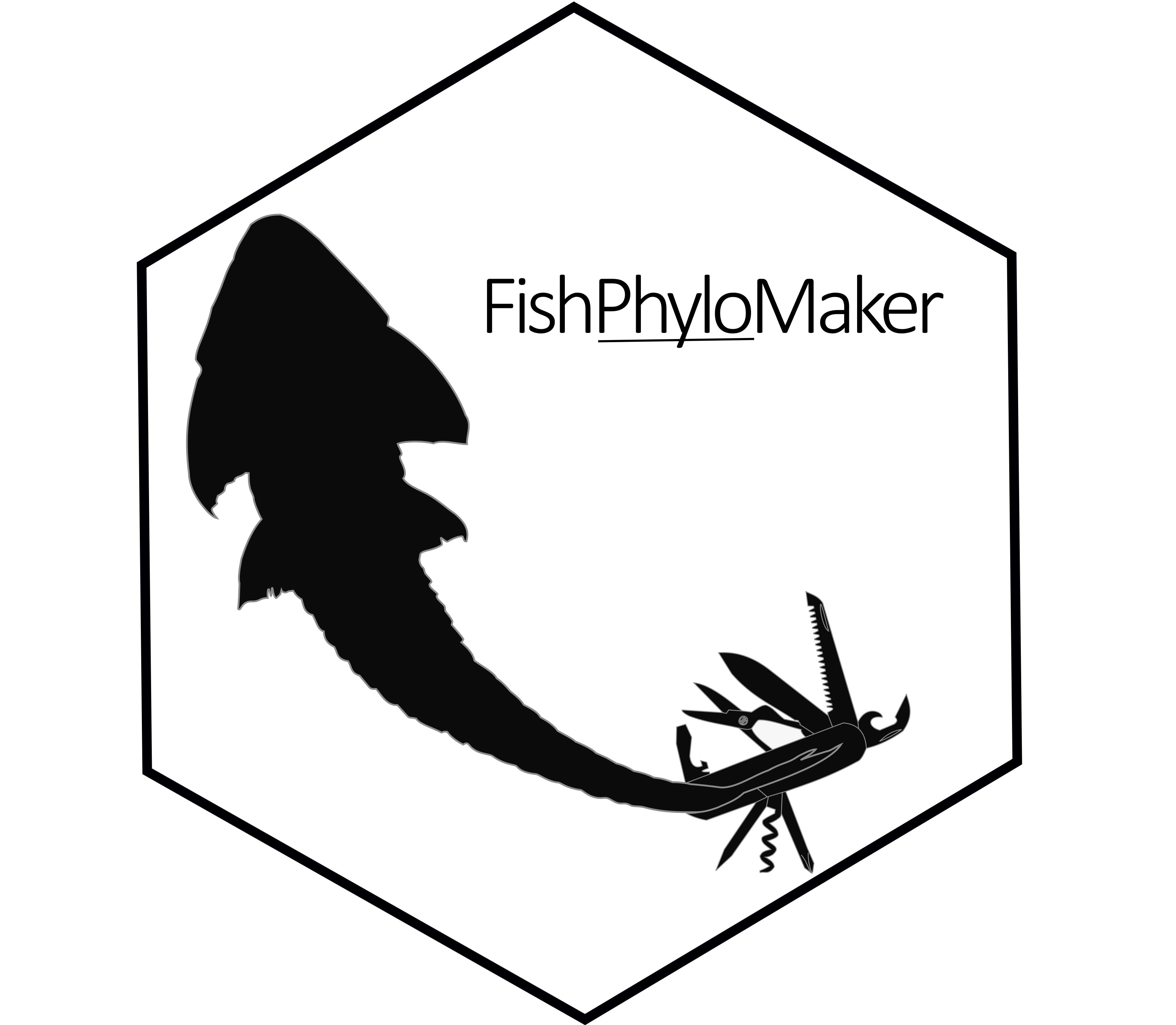
The hardware and bandwidth for this mirror is donated by METANET, the Webhosting and Full Service-Cloud Provider.
If you wish to report a bug, or if you are interested in having us mirror your free-software or open-source project, please feel free to contact us at mirror[@]metanet.ch.

{FishPhyloMaker} is an R package that allows to
construct synthesis phylogenies for finned-ray fishes. The package has
two main functions, FishTaxaMaker and
FishPhyloMaker. The first generate a data frame from fish
species names provided by the user, checking the validity of these names
and possible synonyms by using the information contained in Fishbase database through the package
rfishbase.
The output of FishTaxaMaker() function is a list containing
the following objects:
All_info_fishbase: A data frame containing the taxonomic classification of valid species accordingly to Fishbase;
Taxon_data_FishPhyloMaker: A data frame with three columns containing the valid scientific name of the species (s), its family
FishPhyloMaker() to generate the phylogeny;Species_not_in_Fishbase: A character vector containing the names of species that was not found in Fishbase with a valid name data frame object containing three columns with the name of species (s), the Family (f) and the Order (o) of all species provided by the user.
Besides to help checking the validity of the names of species, its
synonyms and duplicated species, the data frame returned by
FishTaxaMaker() in
Taxon_data_FishPhyoMaker are formatted so that it can
be directly used in the core function FishPhyloMaker().
This function will use the information of the taxonomic hierarchy
contained in the data frame returned from FishTaxaMaker(),
joint with the information present in the the fishtree of life project to
construct the phylogenetic tree.
You can install the development version from GitHub with:
devtools::install_github("GabrielNakamura/FishPhyloMaker", ref = "main", build_vignettes = TRUE)To run an example the user can load a data set present in the package:
library(FishPhyloMaker)
data(neotropical_comm)
data_comm <- neotropical_comm[, -c(1, 2)] # removing latitude and longitudeThis data set comprises a community matrix with the occurrences of 59 fish species in headwater streams of Parana and Paraguai River Basins, in Brazil. The coordinates of these streams are presented in the two first columns of this data set.
First the user must obtain the data necessary to enter in
FishPhyloMaker using FishTaxaMaker
function.
taxon_data <- FishTaxaMaker(data_comm, allow.manual.insert = TRUE)
Characidae
Characiformes
Characidae
Characiformes
Characidae
Characiformes
Loricariidae
Siluriformes
Cichlidae
Cichliformes
Crenuchidae
Characiformes
Gymnotidae
Gymnotiformes
Loricariidae
Siluriformes
Loricariidae
Siluriformes
Loricariidae
Siluriformes
Loricariidae
Siluriformes
Heptapteridae
Siluriformes
Characidae
Characiformes
Loricariidae
Siluriformes
Characidae
CharaciformesFishTaxaMaker finds in Fishbase for the family
and the order of species provided in data argument. If any species was
not find in Fishbase, the user will be asked to type the Family and the
Order of this species manually. This function can also be useful to
check possible misspelling errors in the name of species.
Finally run FishPhyloMaker
res_phylo <- FishPhyloMaker(data = taxon_data$Taxon_data_FishPhyloMaker,
insert.base.node = TRUE,
return.insertions = TRUE,
progress.bar = TRUE)The species are inserted in a sequential procedure. Species with any family representatives will be printed in the console jointly with a list of Genus contained of its family contained in the three, so that the user must choose. The user have three options:
The output has two objects, a phylogenetic tree that can be directly plot with the following code:
plot(res_phylo$Phylogeny, cex = 0.7)And a data frame indicating at which level the species was inserted (one of the six categories detailed above).
res_phylo$Insertions_dataFor more details and updates see FishPhyloMaker web page
These binaries (installable software) and packages are in development.
They may not be fully stable and should be used with caution. We make no claims about them.